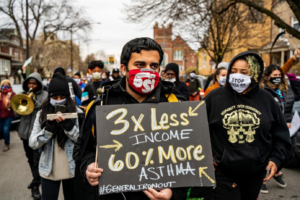“It was déjà vu all over again,” Gwen Carr said about the police-involved deaths of her son, Eric Garner, in 2014 and George Floyd on Monday.
Gwen Carr was horrified by what she saw in the video — a black man groaning on the ground with a police officer’s knee on his neck, his repeated cries of “I can’t breathe” — which brought back a painful memory for her.
Carr, the mother of Eric Garner, an unarmed black man who died after he was held in an apparent chokehold by a New York Police Department officer in July 2014, said Tuesday that she could barely stomach this latest viral cellphone recording of the man’s Memorial Day death in Minneapolis, which has triggered a national outcry and an FBI investigation.
“It was déjà vu all over again,” Carr told NBC News about the parallels she noticed. “It’s like a reoccurring nightmare,” she said.
The man in the video, which was taken by a bystander, could be seen pinned by the officer on the roadside near the back tire of a police car.
“Please, please, please, I can’t breathe,” the man, later identified as George Floyd by his family’s attorney, is heard saying several times in the video. Police said he was unarmed.
Garner, a father of six, had uttered that same phrase — “I can’t breathe” — 11 times after Daniel Pantaleo, an NYPD officer in plainclothes, pulled him by the neck with his forearm and to the sidewalk in a case that was also captured on cellphone video. Garner, who was accused of selling loose, untaxed cigarettes, later died at a hospital, with nationwide protests erupting after a grand jury declined to indict Pantaleo.
Full coverage of George Floyd’s death and protests around the country
NYPD officer tied to Eric Garner’s death won’t face federal charges
“I can’t breathe” was shouted at Black Lives Matter demonstrations, written on posters and worn on T-shirts, including by professional athletes at sporting events.
Carr said Floyd’s death was haunting for her after watching a portion of it.
“I don’t see any justification,” she said. “To put your knee on someone’s neck, you are obstructing their breathing. That is completely a no-no.”
Minneapolis police said the officers were responding to a report of a forgery in progress at a grocery store just after 8 p.m. Monday. Police said the man stepped out of his car when commanded, but then physically resisted. The officers were able to place handcuffs on him, but “he appeared to be suffering medical distress,” police said in a statement.
An officer placed his knee on the man’s neck for about eight minutes, doing so as the man appeared to remain unresponsive before paramedics arrived, the video shows. Police said that he was transported to a hospital, where he died a short time after.
Carr said the officer’s actions were jarring when it appeared that Floyd needed help.
“Why would you keep your knee there?” she asked. “After three minutes, you don’t realize that this man is saying that he can’t breathe? And he’s struggling, struggling for life?”
The officers at the scene were not immediately identified and were initially put on paid leave, Minneapolis police Chief Medaria Arradondo said at a news conference Tuesday morning. But later Tuesday, Mayor Jacob Frey tweeted that four officers involved were fired.
The FBI was asked to assist in the case, Arradondo said, after a “community source” provided more context about the incident, causing concerns of possible civil rights violations.
While the federal agency is now leading the investigation, state authorities are also interviewing witnesses, and a completed review will be sent to the Hennepin County Attorney’s Office.
“Whatever the investigation reveals, it does not change the single truth that he should be with us this morning,” Frey told reporters about Floyd, adding, “Being black in America should not be a death sentence.”
The Police Officers Federation of Minneapolis, which represents the department’s 800-plus rank-and file officers, asked the public not to rush to judgment before all video can be reviewed and a medical examiner’s report is released.
“Officers’ actions and training protocol will be carefully examined after the officers have provided their statements,” the union said.
“We ask that the community remain calm and let the investigation be completed in full,” it added.
The family of Floyd, who worked as a security guard at a Latin restaurant and dance hall, has retained prominent civil rights attorney Benjamin Crump, who also represented Garner’s family.
“How many ‘while black’ deaths will it take until the racial profiling and undervaluing of black lives by police finally ends?” Crump asked Tuesday.
Garner’s case was among a spate of other high-profile deaths across the country of black people at the hands of police. The Minneapolis area was at the center of a firestorm in 2016 when suburban police officer Jeronimo Yanez killed Philando Castile, a black driver, during a routine traffic stop that was broadcast on Facebook live — touching off a national conversation about race and gun rights. The officer was acquitted of manslaughter charges the following year.
“Nearly six years after Eric Garner’s death in New York — and four years after Philando Castile’s in Minnesota — this tragic video shows how little meaningful change has emerged to prevent police from taking the lives of Black people,” Paige Fernandez, the policing policy adviser for the American Civil Liberties Union, said in a statement.
Carr said she’s wary of the FBI’s assistance in Minneapolis after Attorney General William Barr made the final determination last summer not to charge Pantaleo, the officer who tried to arrest her son — capping years of a winding investigation and drawn-out legal fights.
The prosecutors’ case had hinged on proving that Pantaleo acted willfully when he used more force than was necessary to arrest Garner.
Garner suffered an asthma attack and went into cardiac arrest while he was being restrained, the city’s medical examiner said, ruling his death a homicide caused by a chokehold that was a “significant initial factor.”
Although he escaped prosecution, Pantaleo was fired from the NYPD in August 2019. He filed a lawsuit last fall to be reinstated.
While Minneapolis has moved swiftly to fire the officers who took part in Floyd’s death, Carr said she hopes justice can be attained much sooner than in her son’s case. In the wake of Garner’s death, she called on Congress to pass a federal law barring officers from using chokeholds — aimed at creating more accountability for police departments.
“I hope this family doesn’t need to suffer like I suffered for six years,” she said.




